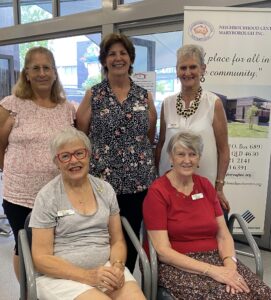Maryborough’s Cancer Support Program is a group that provides a safe and welcoming environment for people to connect with others who are living with, have survived or are supporting someone with a cancer diagnosis. From singing and dancing, to resources and presentations, the innovative program provides vital connection and support in an area where no other similar groups existed.
The group started at the Maryborough Neighbourhood Centre, which has been a supporter of the Cancer Council through hosting Australia’s Biggest Morning Tea fundraisers since 2014. Gay Cayabyab, Maryborough’s Centre Manager highlighted, the success of the fundraisers, with the participants growing year on year.
“The fundraisers started with 30 people having morning tea in the courtyard supporting the event, then 40 the next, until we decided we need to move the event to the hall to accommodate at least 100 people.”
In the following years, people started inquiring at the Centre about local cancer support groups. With minimal options available in the area, Gay took it upon herself to find willing volunteers to help her start a group at the Centre.
“In 2018, we started receiving queries about support groups for Cancer patients and those affected by the disease. There was nowhere we could refer them to in Maryborough, except for specialized support groups such as the one for prostate and breast cancer patients. In 2019, at our Biggest Morning Tea fund raising event, I decided to put the word out there, and asked those in attendance if anyone would be interested to volunteer and support the forming of a Cancer Support Group, very quickly 4 ladies raised their hands and expressed their interest to volunteer.”
Gay moved swiftly to establish the group, locating resources, developing a plan and registering the group with Cancer Council Queensland.
“With four committed volunteers, I immediately signed them up and started work on devising guidelines and procedures for implementation. I took the opportunity of accessing the resources available through the Cancer Council Qld (CCQ) website and took it a bit further by registering the support group with CCQ and getting the designated volunteer coordinator to attend a workshop so that our group can get recognized.”
The Cancer Support Group had their first meeting in 2019, and over time Gay and her team of volunteers have responded with flexibility, adapting the group structure to the needs of its members.
“The first meeting was in 2019, we had about 10 participants, for the next three months we run the program as any support group would, introduction by each participant and the opportunity to talk about their situation. There were some strict rules that were laid out to ensure a smooth confidentiality and privacy. After three months of doing this, we started to lose some of the participants, this is when I realised that as much as this is a support group for those affected by Cancer, Cancer does not have to be in it.”
The group has since developed to include a number of creative, fun and engaging initiatives that help to create a positive atmosphere and build social engagement and connection between members.
“We changed the format, participants only introduced themselves if there were new members, we made the sessions so interesting and diverse that participants begun to look forward to attending the session each month. We combine the sessions with presentations from guest speakers and other activities such as singing, dancing, arts and crafts, flower arranging and even cake decorating.”
The team has made every effort to ensure they keep in touch with members and that support is continued through challenging circumstances.
“During the pandemic, when the Centre had to close its doors, we started the Social Phone Call Initiative where one of the volunteers would ring each participant fortnightly for a chat and just to reach out. This program continues up to this day to engage those who are not quite ready to attend the sessions.”
Their efforts have paid off, and today the program still continues to provide ongoing support to nearly 30 members.
“We have lost some participants to Cancer through the years, and some were unable to attend due to other challenges, but to date we continue to have close to 30 participants who attend the program. On the average we get about 15 to 22, but we continue to keep in contact with everyone through a social phone call initiative.”
This is an incredible initiative, that was driven by a response to community need and provides vital support, safety and connection to people going through an unimaginably challenging period in their life.
Written By: Taylor Bast
Published: April 2023
